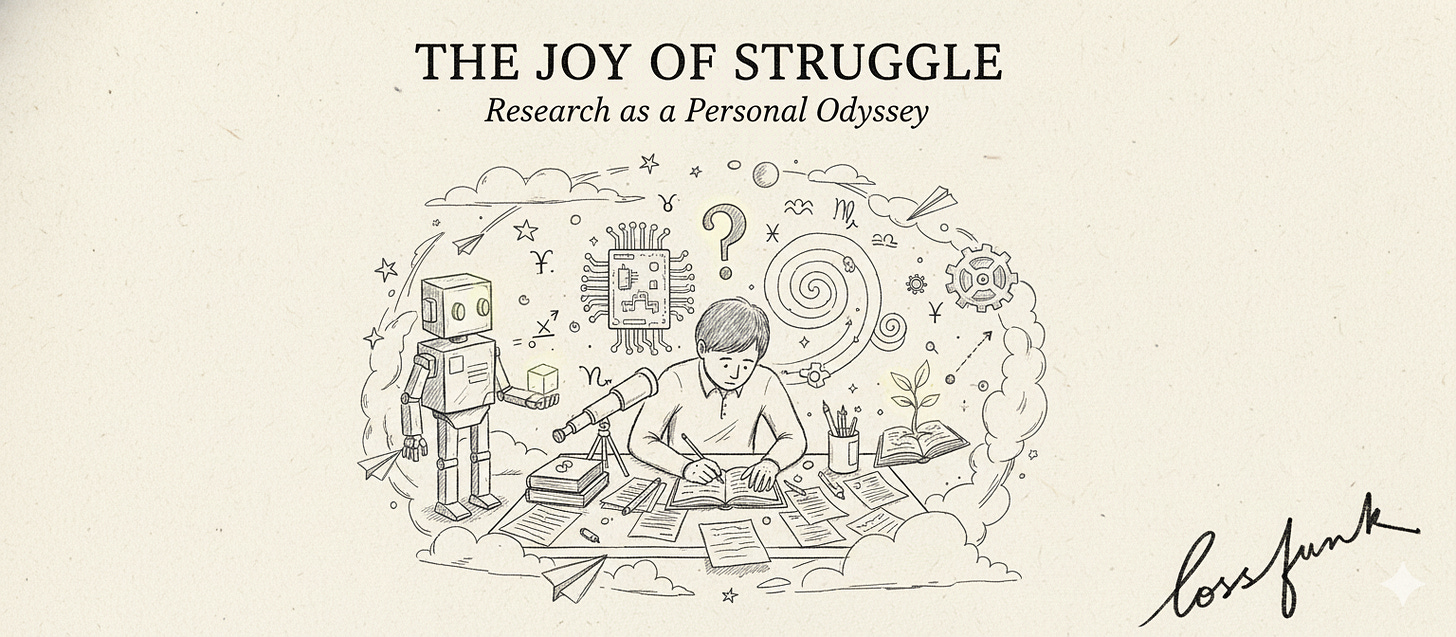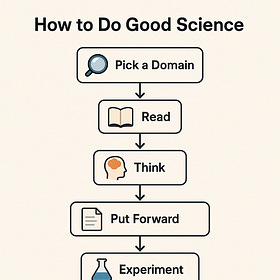What's the point of doing research?
The fun of the struggle is the point
Compared to engineered products that we use daily, sometimes it feels like that a research project doesn’t produce much of value. While ChatGPT as a product feels concrete, a paper and a repository you produce at the end of your research feels flimsy, ethereal and temporary.
The median research paper is only read by the authors and the editors of the journal. So, why do researchers choose to engage in an activity where the end product will likely won’t be appreciated by anyone?
Looking at research from this point of view can be demotivating, but I think there’s another way of seeing it.
What if the point of research and the value of it is in the struggle you go through in grappling in area that’s new to you or the world?
Let’s unpack this.
The joy of struggle
There are some things in the world that can’t be made more efficient. Learning is one of them. Beyond a point, you can’t make learning more efficient as grasping a topic requires mental struggle. Learning is like going to the gym where struggle is the entire point. You can’t delegate that effort to someone else.
Seen from a productive struggle point of view, research is a unique and the only opportunity to confront your most burning questions face to face. This face-off with questions that haunt you requires you to deep dive into what others have said or found about it, and then taking a stab at it from your own personal point of view.
Manifesto for doing good science in AI
Lossfunk is a new AI lab that aims to be a cosy home for independent researchers. We aim to be curiosity-driven alternative to academia and industry. As a founder of the lab, I wanted to share my thoughts on what doing good science means with all incoming researchers so we have an alignment in our culture and values.
Research feels hard because struggle is the point of it, and like Sissiphys, you must learn to enjoy the process of it. Whether an important paper comes out of your research is besides the point. In fact, since greatness cannot be planned, whether your research creates a large impact or not is also something you can’t control. So, the most direct value of research is in how the struggle of it changes the way you think, live or feel.
Merely reading someone else’s paper only gives you partial value as you don’t undergo the same struggle, and hence don’t internalize the insights in the same deep way as you do when you conduct research yourself.
But since you cannot give equal passion to all problems, this makes choice of research problems more important than anything else. So research - which is an attitude to ask and answer interesting unanswered questions - requires you to make questions important to you central to the activity.
You want to choose a research problem that’d make the struggle feel fun and meaningful to you.
Ask yourself: what is the question that burns so deeply in your mind that you’d enjoy struggling it with? For Einstein it was “why does acceleration feel the same as gravity”. For Darwin it was “why do finch beaks differ so much from island to island”. At Lossfunk, our burning questions are foundational - why does our universe seem finetuned? what is general intelligence? is life inevitable? and so on…
But, what is that burning question for you?
Research is personal
Research differs from merely reading about a subject matter from a paper or a book as research is foremost personal. It concerns with the specific questions you are interested in v/s textbooks where you follow a path laid down by someone else.
Of course, during the course of research you would read books or papers written by others and will likely discover that your question has been answered by others.
At that point, instead of getting dismayed that someone else did it first, it should be a cause for celebration. The process of building conviction on your research question would have taught you so many new things. You should reflect on how deeply your brain is shaped when you struggle with a difficult question and finally find a satisfying conclusion.
At this stage you can synthesise an artifact (a blog post or a position paper) summarising your understanding. Or you can discover an interesting overlooked angle that can be explored.
Something like this recently happened with me. I have been reading about metaphysics and asking myself why certain questions such as “what is time?” puzzle us. I thought I had a unique perspective on it, but as I started doing what philosophers have said about it, I discovered a wonderful collection of people - Quine, Dewey, Later Wittgenstein, Sellars - who’ve said a lot of smart things about this question.
At first, it pinched me that I have nothing unique to say. But then I realized that in trying to synthesise what others have said about my research question was the whole point. I understood the domain deeply and discovered connections between metaphysics and AI, something not a lot of people have explored before. So, now I’m in the process of writing a paper on metaphysics and AI.
Contrast this with a counterfactual: a world where I had gone to Wikipedia and simply read the entry on metaphysics. While interesting, it would not have penetrated deeply inside me unless I had made it into my personal research project.
So - to reiterate - the primary value of doing research is in how it changes the researcher.
Everything else - papers, fame, useful discoveries - is an added bonus.
The author, Paras Chopra, is founder and researcher at Lossfunk.



How do you navigate a society that measures your worth by how much you’ve earned, especially when research isn’t always the most profitable path? It’s wild how much the world around us ends up shaping how we think and behave.
i think passion is kind of misinterpreted. I dont think einstein was bothered by the question of acceleration as much as we believe to be. Its more curiosity driven and a desire to solve hard problems. Richard Feynman tried his hands at practically everything and what stood out was how fascinating everything looked to him and how he interpreted stuff from Physics to something as trivial as hotel room booking. Imo the point of research is the same as building anything else, doing hard problems and finding a way out. The more i figure out PhD the more i feel its like a startup where you have to drive every single detail yourself. And fields change so quickly that the real passion is not in the question but rather why even bother with this question